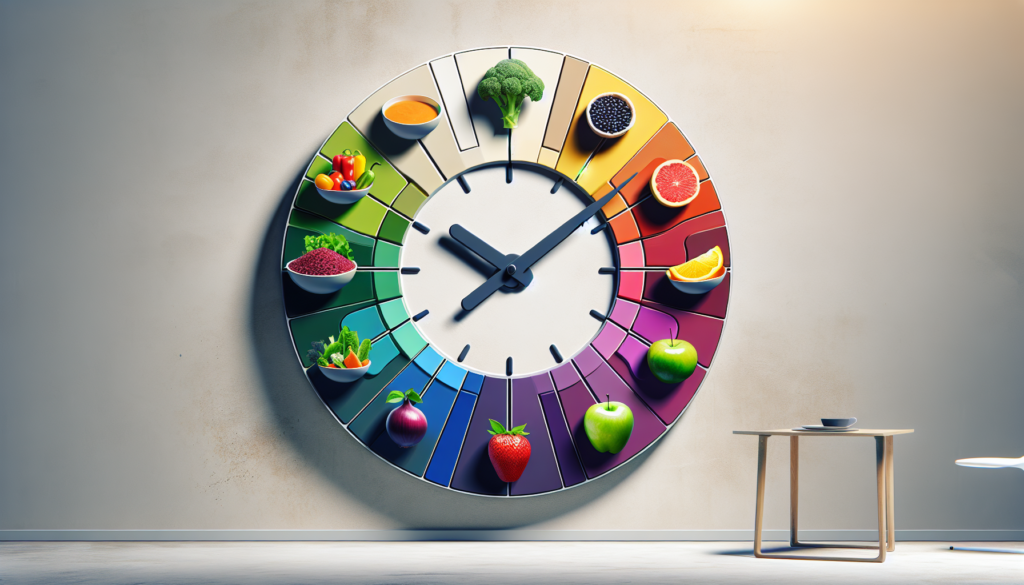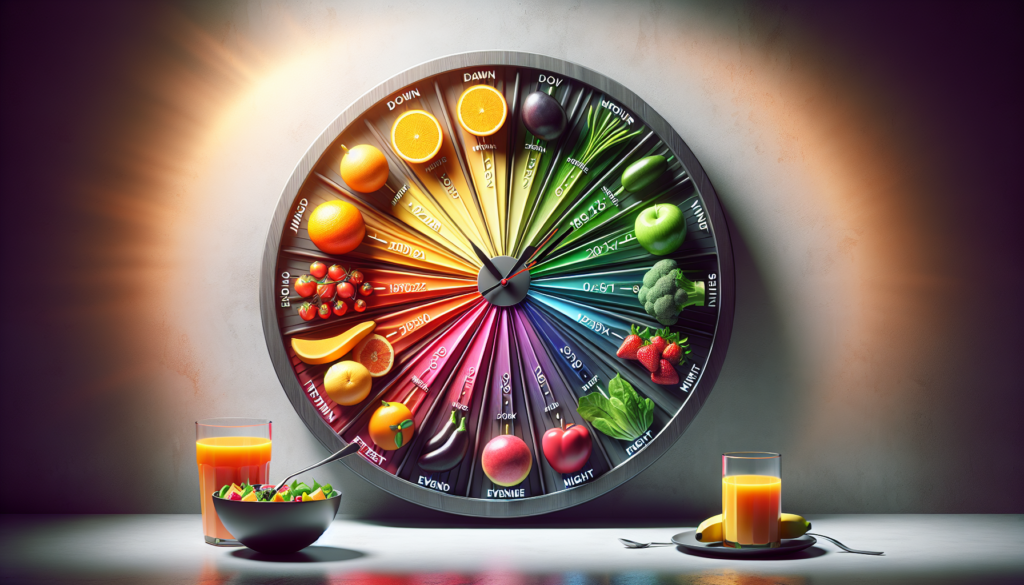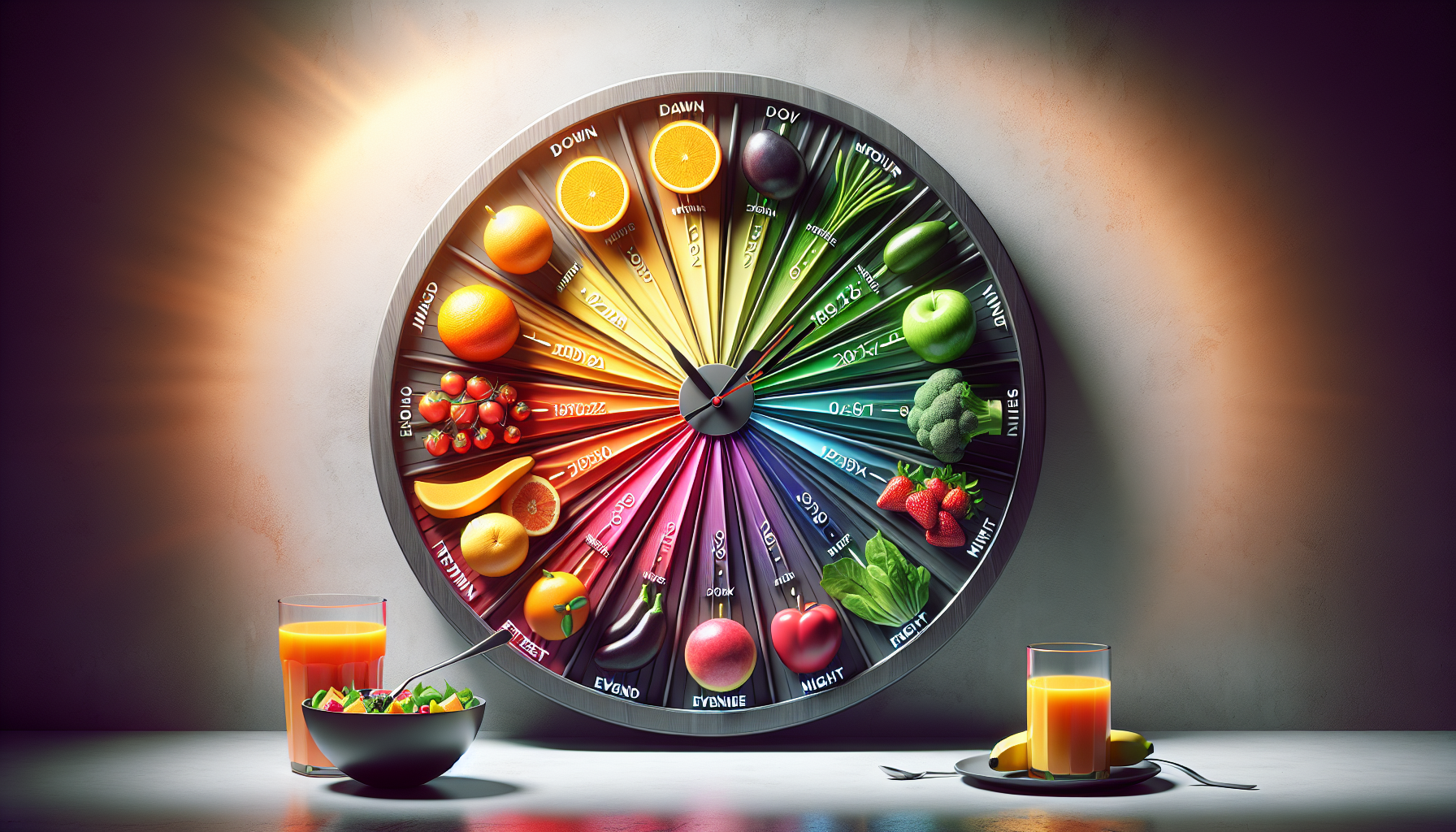Did you ever wonder why sometimes you feel like a caffeine-fueled squirrel while at other times you resemble a couch potato’s distant relative?
Believe it or not, the secret might lie in how you orchestrate your culinary symphony, also known as meal timing. Don’t roll your eyes just yet! We’re about to unravel the saga of meal timing with the flair of a late-night infomercial and the wisdom of your granny’s old recipes (minus the questionable jello salads).
The title, if you didn’t guess it, is “Timing Your Meals For Maximum Energy.” So grab your favorite snack (appropriately timed, of course) and put on your thinking hat. This is going to be a rollercoaster ride through the land where time and food unite to create the perfect superhero sidekick: energy.

Why Timing Your Meals is Like Riding a Rollercoaster
Let’s face it: Meal timing is the silliest thing you never knew mattered. But before you laugh out loud and fall off your chair, consider this – your stomach and circadian rhythms are like two best friends with an eternal love-hate relationship. By the way, if you think circadian rhythms sound like a trendy music band, you’re not far off. It’s the fancy term for your body’s internal clock that makes you want to nap during office meetings or wake up precisely two minutes before your alarm.
Eating at the wrong time is like booking a non-refundable ticket on a rollercoaster run by Drowsy Dave. Let’s look at how to sidestep such mishaps and rev up your energy levels.
The Science-y Bit: Why Should You Care About Meal Timing?
Imagine your metabolism as a grumpy cat. It likes things just so: fed at certain times, preferably when the sun is up, and definitely not amused by those midnight snacks. When you eat doesn’t only affect your energy, it can make a difference in how efficiently your body digests food, which in turn helps you feel more like your energetic five-year-old self.
Your body’s clock is all about rhythm, and meal timing is the drummer keeping the beat. Eating in sync with your circadian rhythms can help with better weight management, improved metabolic health, and making sure you don’t turn into a grumpypotamus by 3 PM. Now, doesn’t that sound fabulous?
Breaking Down: When Should You Eat?
Breakfast: The Unsung Hero
For centuries, breakfasts have been pushed around, skipped, and turned into brunch. It’s time to give this under-recognized meal the accolades it deserves. So, when should you break the fast? Ideally, within two hours of waking up. This helps kick-start that metabolism of yours and sends the signal that it’s time to seize the day, not the pillow.
Think of breakfast as the fuel injection that keeps your proverbial rocket engine chugging along smoothly. Pairing proteins with slow-releasing carbohydrates is the golden ticket. So, breakfast burritos or omelets with a side of oatmeal? Yes, please!
Mid-Morning Munchies: Yay or Nay?
Here’s where things get interesting. The mid-morning snack, often ogled with more suspicion than love handles, can either be your saving grace or your undoing. Generally, if you had a balanced breakfast, you may not need this snack. But sometimes, your stomach decides to play an impromptu game of “Feed Me Seymour,” and that’s when a small, healthy snack can do wonders.
The secret here is in listening to your body. Is it real hunger or the donut-shaped mirage enticing you from the break room? Opt for something light like a piece of fruit or a small handful of nuts if you must curb the munchies.
Lunch: Making It Work
By now, your morning coffee is but a distant memory and your energy is dropping faster than a soap opera cliffhanger. It’s lunchtime! Aim to eat around the middle of the day, which coincidentally aligns with the time when you’re most likely to daydream about retiring to a tropical island. Make lunch the mighty bastion of balance it deserves to be: a blend of lean protein, complex carbs, and healthy fats.
A salad might work for some, a wrap for others. Go for something that won’t leave you feeling like a boa constrictor post-buffet, but will satisfy your inner food critic.
The Great Afternoon Slump Slayer: Snacks Again?
If you’ve ever felt like criminals stole your energy around 3 PM, you aren’t alone. The afternoon slump is as universal as breathing and overplayed pop songs. The trick is to commandeer the slump with a well-timed snack attack. This doesn’t mean raiding the vending machine; instead, think smart nibbles like Greek yogurt or carrot sticks and hummus.
Snack or no snack, being wise about what you munch on here can be the difference between zipping through the afternoon or being mistaken for a nap statue in the office.
Dinner Defining Moments
Dinner: The curtain call. The last act. The meal that can spell the difference between a restful night’s sleep or a live-action rerun of your day’s calorie intake. Aim to wrap it up a few hours before bed, to give your body enough time to digest before you dream of sugarplums or, more likely, that awkward high school dance.
The secret sauce here is in moderation. Go for a delicate balance – not too heavy, not too sparse. Picture yourself as Goldilocks with a plate: it has to be just right. A sensible blend of veggies and protein, maybe a small carb if you’ve been especially good and avoided throwing an impromptu all-carb fiesta earlier in the day.
Secret Tips to Make Meal Timing Work for You
The Food Journal Revolution
Keep a food journal, they said; it will be fun, they said. Well, guess what? It can be, especially if you approach it like detective work! Track what you eat and note the times, then juxtapose that with your mood and energy levels. Soon, you’ll connect the dots faster than Sherlock Holmes, albeit with snacks instead of crimes.
Yes, Intermittent Fasting is Trending, but Will it Turn You Into a Walking Zombie?
Ah, intermittent fasting, the buzzword that’s been garnished with more fanfare than avocado toast. Before you embark on a fasting spree, consider your energy needs. Sure, it might give some people a zen-like glow, but ask yourself if you’ll become a hangry mess by noon. Test drive it if you must but go easy and feel things out.
Meal Prep: Your New Best Friend
You might dislike meal prepping more than wearing socks with sandals, but pairing them isn’t necessary here. By planning your meals ahead, you can better align them with your energy needs and timings. Plus, come Monday, you’ll have a fridge stocked quicker than reality TV drama.
Common Mistakes: How Not to Time Travel with Your Meal Schedule
Chaotic Meal Times: The “I’ll Eat Whenever” Strategy
Remember that squirrel? It’s about to faceplant into the reality of erratic meal timings. It’s tempting to become a meal-timing anarchist and chomping down food whenever, but this might just mess with your internal clock, making your energy levels as inconsistent as a cat meme’s virality.
Ignoring the Clock: Oops, Did I Skip Lunch?
Whether you’re a busy bee or distractible hamster, skipping meals can wreak havoc on your energy reserves, leading you to consume a whole buffalo come evening time. Remember, skipping meals doesn’t earn you energy credits—it just makes you more ravenous later. Avoid the bear-like rummage for dinner scraps and ensure you maintain regular meal intervals.
Midnight Munchies: The Sneaky Saboteur
Arguably the most devious of all missteps, the midnight munchie is both alluring and insidious. It throws your circadian rhythm into a tizzy and can make you feel sluggish by daybreak. Stay strong! Combat those night-time cravings by ensuring your dinners are nourishing and satisfying enough.

Wrapping It All Up: Timing Is Everything!
So, what did you learn from our grand tour of meal timing and energy management? Hopefully, you’ve picked up on the fact that aligning your meals with your body’s natural rhythms is more than just a culinary exercise—it’s a way of living that, when mastered, turns you into the energetic gazelle you’re truly meant to be.
To summarize in a less-than-acrobatic fashion: give breakfast its rightful place, wield the power of wisely-chosen snacks, make a friendship pact with lunch, ensure dinners aren’t scene-stealers, and keep the midnight morsels at bay. Your energy levels will rise like a phoenix from the ashes—or at least perk up significantly enough to be noticed at the office water cooler.
And remember, if all else fails, there’s always an app, an audiotape, or neighbors to blame it on. But really, the power is in your hands, or more precisely, in your fork!
